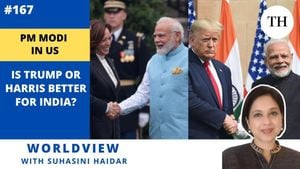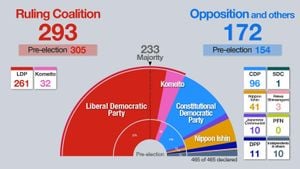The United States has recently intensified its campaign against entities supporting Russia's military efforts amid its protracted war in Ukraine. Almost 400 individuals and companies have been sanctioned, with targets spread across key nations such as India, China, and Turkey. This move aims to dismantle the extensive network enabling Russia to sustain its military operations nearly three years post-invasion.
Among the sanctioned, China stands out as the most significant adversary openly aiding President Vladimir Putin's regime. The sanctions named firms from several countries, including notable collaborators like India and Turkey, raising concerns over tensions with allies actively engaged with the United States. Analysts see this as part of the Biden administration's broader strategy to curb any resurgence of Russian military capabilities.
Deputy Treasury Secretary Wally Adeyemo emphasized the United States' unwavering commitment to diminish Russia's ability to supply its war machinery. "We are unyielding in our resolve to degrade Russia’s capacity and to deter nations aiding their efforts through sanctions evasion," he stated. This declaration underlines the administration's response to Russia's economy, which, according to projections, is set to grow by about 3.5% to 4% next year, contrasting the intent behind the sanctions.
The latest actions highlight the U.S. administration's frustration over the perceived inefficacy of previous sanctions, as trade ties between Russia and certain countries continue to strengthen. India has emerged as the second-largest supplier of advanced technology to Russia, just behind China, showcasing how countries are developing circumvention strategies against Western-imposed restrictions.
Notably, four Indian companies—Ascend Aviation, Futrevo, Shreya Life Sciences, and Mask Trans—were implicated for allegedly facilitating military supply chains to Russia. Reports suggest these firms are supplying advanced components and technologies integral for Russia's war capabilities, from drone technology to general aviation components. This sanctioning wave is indicative of growing apprehension within the U.S. government as India's manufacturing exports to Russia have surged, which could threaten Washington’s geopolitical strategies.
Shreya Life Sciences, for example, is accused of sending considerable shipments of U.S.-trademarked technology to Russia, including sophisticated servers used for artificial intelligence applications. On the other hand, Futrevo has supposedly been instrumental by providing high-priority components required for drones, reportedly leading to increased scrutiny from U.S. officials.
Turkey, likewise, has found itself in the crosshairs of U.S. actions lately. The sanctions target firms accused of shipping material like fuses and microchips, components deemed supporting not just local economic ties but military collaboration. Identifying and penalizing third countries assisting Russia is part of the larger narrative aimed at isolative practices from the U.S., seeking to deter alliances forming between adversarial nations.
This sanctioning episode also subjects Swiss lawyers involved with Russian billionaires to scrutiny, illustrating the U.S.'s desire to disrupt even legal avenues aiding the Kremlin. Entities like The Sister Trust—linked to sanctioned Russian oligarchs—were targeted, highlighting the comprehensive nature of these latest measures.
These developments arrive as the U.S. has sought to extend its reach against the arms supply threads leading to Russia's military-industrial complex, which includes various countries and intermediaries functioning round the globe. Legislation enabling asset seizures belonging to Russia as collateral for aiding Ukraine has been part of the continuous bilateral effort among G7 nations to bolster Ukraine's defensive capabilities.
Despite the sanctions, skepticism remains about their anticipated effectiveness. Reports indicate Russia continues to maintain economic resilience through oil and gas exports, challenging expectations set by the U.S. and its allies. There is growing discourse about the need for stronger action beyond the sanctions alone to effectively diminish Russia's military resources, especially as the constantly morphing ties between adversarial nations come under increasing scrutiny.
Experts monitoring Russia's economy note the growing links with North Korea, which has actively been sending troops to support Russia's military operations. This shift signals desperation from Moscow, as outlined during the recent visit of North Korea's foreign minister to Russia, indicating increasingly entwined fates through the war effort.
Given the complex global relationship dynamics, the U.S. aim to contain Russia's war capabilities continues against the backdrop of fluctuated alliances across nations. Officials stress the importance of monitoring and curbing firms and countries still supplying Russia, reinforcing diplomatic engagements to maintain effective international cooperation.
Consequently, as geopolitical tensions continue to evolve around the Ukraine conflict, the impact of these sanctions raises significant questions about the future of U.S.-China relations, India’s position on the global stage, and Turkey's strategic alignment with NATO. The response from affected countries highlights the delicate balance between obtaining economic gain and adhering to international diplomacy, setting the stage for future dialogue and potential fallout.



